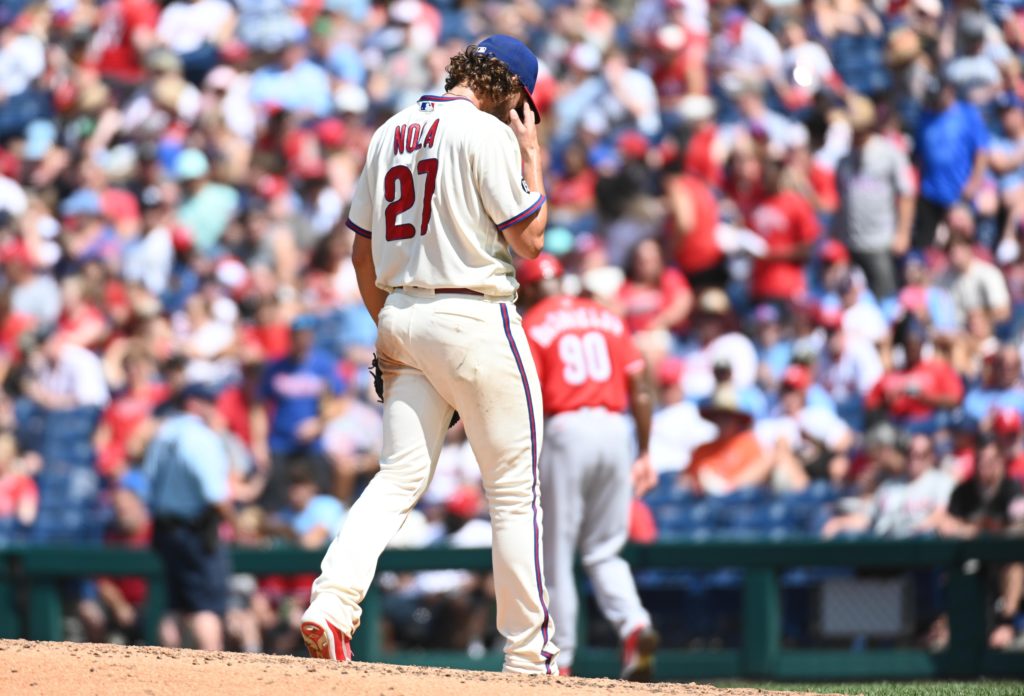Ad Disclosure
Phillies Fall Out of First After Aaron Nola Disappoints Against Reds
By Bob Wankel
Published:

Rain washed away the best version of Aaron Nola after only four innings his last time out. Hoping to build off that brief but encouraging outing on Sunday during the Phillies’ series finale with the Reds, he failed to do so. Instead, Nola looked like a tentative pitcher who felt the forthcoming betrayal of his fastball every time it left his fingertips.
Nola nibbled his way to just one more out than he did in his weather-shortened effort last Tuesday.
He struggled to gain his footing throughout an uneven 88-pitch performance in which he allowed six hits, three walks, and a hit batter en route to giving up four earned runs over 4 1/3 innings. All six hits came in two-strike counts.
Oh fo' Sho❗️ pic.twitter.com/PHQbGsLDS1
— Cincinnati Reds (@Reds) August 15, 2021
“It’s frustrating. I want to go deep for the guys and give them a chance to win,” Nola said after the game. “I didn’t do that today.”
Your view of his performance against the Reds probably depends on the level of kindness with which you view the game. If it happens to be high, you might say he did well to avert a total meltdown by escaping a bases-loaded, no-out jam in the fourth inning unscathed. In doing so, he gave his team a chance.
If that level of kindness happens to range anywhere from low to realistic, you might say he flat-out stunk. His latest lackluster effort came in a 7-4 loss that capped a sobering week for the Phillies, one that removed most of the shine from their sweep of the Mets last weekend.
Perhaps more puzzling than the regularity of Nola’s inconsistencies are the conflicting numbers that tell two different stories about his recent performance. For example, in seven starts dating back to July 6, he has a bloated 4.58 ERA while producing a relatively impressive 1.04 WHIP.
A number of key metrics suggest Nola’s struggles — and his poor results — can at least be partially attributed to bad luck, even if the eye test suggests otherwise. The problem for Nola and the Phillies is that results are the only thing that matter this time of year.
The short of it is this — Nola again came up small in a big spot, and the now second-place Phillies would likely be holding a multi-game lead if he were consistently pitching in the neighborhood of his capabilities.
“It’s execution, that’s all, “Joe Girardi said. “Bottom line. Execution.”
Offensive Struggles Continue
The Phillies scored four runs, so they weren’t exactly shut down by the Reds in this one. Get a good pitching performance, that type of run production might hold up. But they didn’t get a good pitching performance, so the offensive storyline changes to one of missed opportunities.
The Phillies left multiple runners on base in the fourth, fifth, seventh, and eighth innings, while going just 1-for-5 with runners in scoring position.
After scoring just 2.5 runs per game over the final six games of the homestand, the Phillies will need to find a way to get things going on Tuesday night in Arizona where they will face a Diamondbacks pitching staff that entered the day with a National League-worst 5.29 ERA.
These Umpires, Man
I’m not quite ready to become an advocate for robot strike zones, but I’m getting there. The Phillies have nobody to blame but themselves after this one, but they certainly didn’t get any help in the eighth inning from home plate umpire Sean Barber.
It appeared Phillies reliever Connor Brogdon was through his second scoreless inning of the afternoon after painting a two-strike changeup on the inside corner to Cincinnati’s Tucker Barnhart. Had it been properly called, the Phillies would have remained down by just one run.
fire all umps. pic.twitter.com/9YJHSrxZqV
— Absolutely Hammered (@ah_pod) August 15, 2021
The pitch should have been called a strike. It wasn’t. And to the surprise of almost nobody, Barnhart accepted Barber’s gift by promptly lacing an RBI single that gave his team a two-run lead. A batter later, Brogdon was out of the game in favor of Héctor Neris, who was greeted by Tyler Stephenson with a two-run home run.
That’s a three-run swing, one that effectively ended the competitive portion of the game.
Who knows what would have happened had the pitch been properly sized up, but Barber’s bad call — one of many on the day — was undoubtedly a late turning point.
After the game, NBC Sports Philadelphia’s Jim Salisbury asked Girardi if he felt Barber’s zone was “erratic.”
“Yeah, I think if you were to write that, that’s probably really fair,” he said. “The pitch that Brogdon made, that’s a big miss.”
Bob Wankel covers the Phillies for Crossing Broad. He is also the Vice President of Sports Betting Content at SportRadar. On Twitter: @Bob_Wankel E-mail: b.wankel@sportradar.com